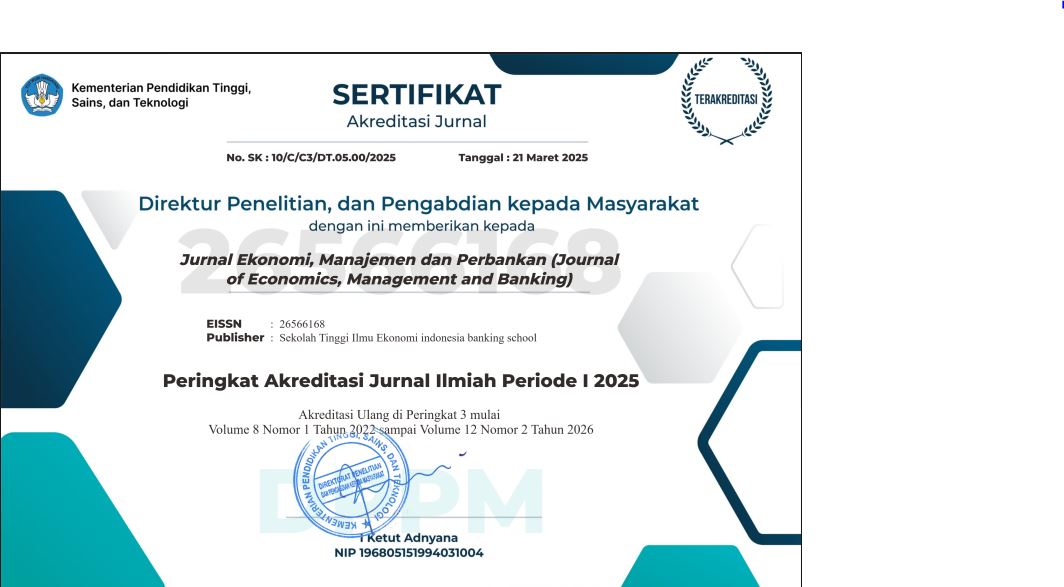Analisis Kemandirian Keuangan Daerah pada Kabupaten dan Kota di Pulau Jawa Tahun 2016 – 2023
DOI:
https://doi.org/10.35384/jemp.v10i2.580Keywords:
Financial Independence, HDI, Panel DataAbstract
This research was conducted with the aim of determining whether or not there is an influence of the Human Development Index, Capital Expenditure, Employee Expenditure and Population Density factors on Regional Financial Independence in Regencies and Cities on the Island of Java in 2016-2023. This research consists of 93 regencies/cities on the island of Java. The data used in this research uses secondary data from panel data for 8 (eight) years 2016-2023. Data obtained from the Directorate General of Fiscal Balance and the Central Statistics Agency were processed using the Eviews 10 application. The results of this research partially show that the Human Development Index variable has a significant effect on Regional Financial Independence, the Capital Expenditure variable has no effect on Regional Financial Independence, the Employee Expenditure variable has an effect significant effect on Regional Financial Independence, and Population Density has a significant effect on Regional Financial Independence. Simultaneous results of the variables Human Development Index, Capital Expenditures, Employee Expenditures, and Population Density have a significant effect on the Financial Independence of Regencies and Cities on the Island of Java in 2016-2023. The results of the coefficient of determination test produce that the independent variable influences the dependent variable by 92.76% and the remaining 7.24% is explained by other variables not included in the regression and panel estimation models in this study.
References
Ahyani, W., & Saleh, S. (2016). Faktor-Faktor yang Mempengaruhi Kemandirian Keuangan Daerah pada Kabupaten dan Kota di Wilayah Provinsi Jawa Tengah Tahun 2010-2014. Universitas Gadjah Mada. https://etd.repository.ugm.ac.id/penelitian/detail/102371
Anisa, S. (2023). Analisis Faktor-faktor yang Mempengaruhi Kemandirian Keuangan Daerah pada Daerah Hasil Pemekaran (Studi Kasus Kabupaten dan Kota Provinsi Banten dan Gorontalo). https://eprints.untirta.ac.id/21618/1/SITI%20ANISA_5553180003_fulltext.pdf
Ardiyanto, D., & Saleh, S. (2023). Faktor yang Mempengaruhi Kemandirian Keuangan Kabupaten/Kota Pulau Jawa: Tahun 2015-2020. Universitas Gadjah Mada.
Becker, G. S. (1993). Human Capital: A Theoretical and Empirical Analysis, with Special Reference to Education. The University of Chicago Press. https://www.nber.org/system/files/chapters/c3730/c3730.pdf
BPK. (2006). Peraturan Menteri Dalam Negeri (Permendagri) No. 13 Tahun 2006 tentang Pedoman Pengelolaan Keuangan Daerah. 1–73. https://peraturan.bpk.go.id/Home/Details/126455/permendagri-no-13-tahun-2006
BPK. (2022). Undang-undang (UU) Nomor 1 Tahun 2022 tentang Hubungan Keuangan antara Pemerintah Pusat dan Pemerintah Daerah. https://peraturan.bpk.go.id/Details/195696/uu-no-1-tahun-2022
BPS. (2023). Kepadatan Penduduk menurut Provinsi (jiwa/km2).
Buchanan, J. M. (1962). The Calculus of Consent: Logical Foundations of Constitutional Democracy. Liberty Fund. http://files.libertyfund.org/files/1063/Buchanan_0102-03_EBk_v6.0.pdf
Fatkhurohman, S. (2022). Analisis Faktor-Faktor Yang Mempengaruhi Kemandirian Keuangan Daerah Provinsi Aceh Tahun 2015-2020. https://eprints.untirta.ac.id/26422/
Fukuda-Parr, S., & Kumar, A. K. S. (2003). Measuring Human Development: A Primer. Oxford University Press.
Halim, A. (2007). Manajemen Keuangan Daerah (3rd ed.). UPP AMP YKPN.
Mahmudi. (2010). Manajemen Kinerja Sektor Publik. UPP STIM YKPN.
Musgrave, R. A. (1989). Public Finance in Theory and Practice (5th ed.). McGraw-Hill Education. https://www.nispa.org/files/publications/ebooks/Public-Finance-Theory-and-Practice.pdf
Pasichnyi, M., Kaneva, T., Ruban, M., & Nepytaliuk, A. (2019). The Impact of Fiscal Decentralization on Economic Development. In Investment Management and Financial Innovations (Vol. 16, Issue 3, pp. 29–39). LLC CPC Business Perspectives. https://doi.org/10.21511/imfi.16(3).2019.04
Sen, A. (1999). Development as Freedom. Oxford University Press.
Sukirno. (2006). Ekonomi Pembangunan: Proses, Masalah dan Dasar Kebijakan. Kencana.
Tabroni, R. (2020). Analisis Pengaruh Belanja Modal, PDRB, dan IPM Terhadap Kemandirian Keuangan Daerah di 8 Provinsi di Indonesia Tahun 2014-2018. Skripsi. https://eprints.untirta.ac.id/15665/2/BAB%202.pdf
Thompson, W. S. (1929). Population. American Journal of Sociology. https://u.demog.berkeley.edu/~jrw/Biblio/Eprints/%20T-V/thompson.1929.AJS.population.pdf
Wahyuni, E., & Ardini, L. (2018). Pengaruh Kinerja Pendapatan Asli Daerah, Belanja Modal dan Belanja Pegawai terhadap Tingkat Kemandirian Keuangan Daerah. http://jurnalmahasiswa.stiesia.ac.id/index.php/jira/article/view/203
Wardani, D. (2023). Pengaruh Pendapatan Asli Daerah, Belanja Modal, dan Belanja Pegawai terhadap Kemandirian Keuangan Daerah. Universitas Siliwangi. http://repositori.unsil.ac.id/10500/
Downloads
Published
Issue
Section
License
Copyright (c) 2024 Muhammad Nasim Harahap, Muhammad Giri Ainul Yaqien , Hady Sutjipto , Deris Desmawan

This work is licensed under a Creative Commons Attribution-NonCommercial-ShareAlike 4.0 International License.
Authors who publish with this journal agree to the following terms:
- Authors retain copyright and grant the journal right of first publication with the work simultaneously licensed under a Creative Commons Attribution License that allows others to share the work to acknowledge the work's authorship and initial publication in this journal.
- Authors can enter into separate, additional contractual arrangements for the non-exclusive distribution of the journal's published version of the work (e.g., post it to an institutional repository or publish it in a book) with an acknowledgment of its initial publication in this journal.
- Authors are permitted and encouraged to post their work online (e.g., in institutional repositories or on their website) before and during submission. It can lead to productive exchanges and earlier and greater citation of published work.















